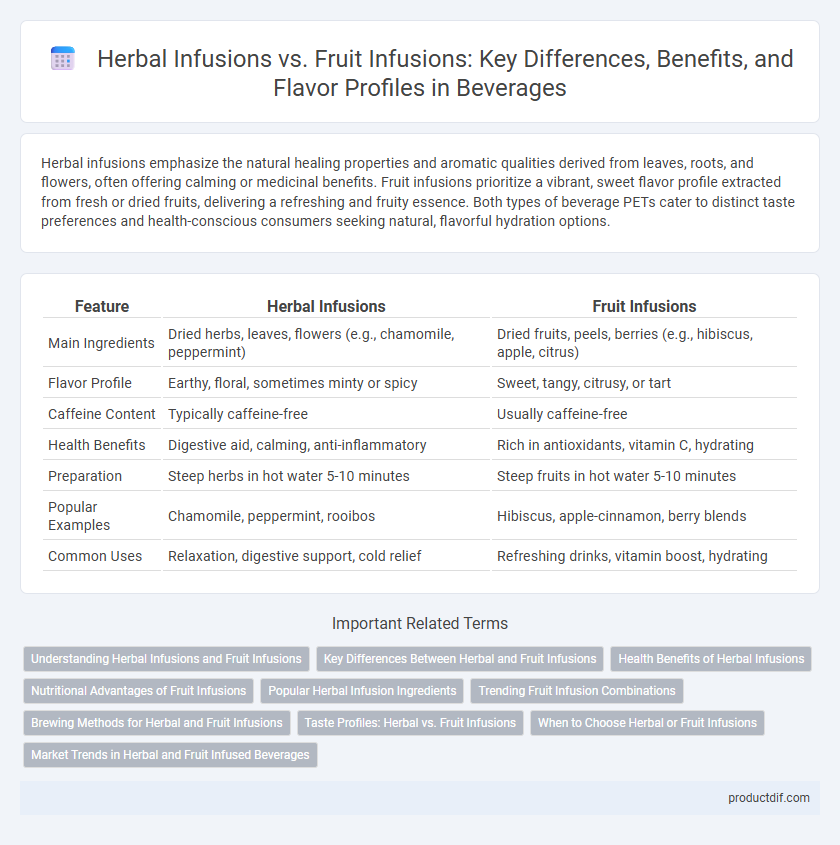Herbal infusions emphasize the natural healing properties and aromatic qualities derived from leaves, roots, and flowers, often offering calming or medicinal benefits. Fruit infusions prioritize a vibrant, sweet flavor profile extracted from fresh or dried fruits, delivering a refreshing and fruity essence. Both types of beverage PETs cater to distinct taste preferences and health-conscious consumers seeking natural, flavorful hydration options.
Table of Comparison
| Feature | Herbal Infusions | Fruit Infusions |
|---|---|---|
| Main Ingredients | Dried herbs, leaves, flowers (e.g., chamomile, peppermint) | Dried fruits, peels, berries (e.g., hibiscus, apple, citrus) |
| Flavor Profile | Earthy, floral, sometimes minty or spicy | Sweet, tangy, citrusy, or tart |
| Caffeine Content | Typically caffeine-free | Usually caffeine-free |
| Health Benefits | Digestive aid, calming, anti-inflammatory | Rich in antioxidants, vitamin C, hydrating |
| Preparation | Steep herbs in hot water 5-10 minutes | Steep fruits in hot water 5-10 minutes |
| Popular Examples | Chamomile, peppermint, rooibos | Hibiscus, apple-cinnamon, berry blends |
| Common Uses | Relaxation, digestive support, cold relief | Refreshing drinks, vitamin boost, hydrating |
Understanding Herbal Infusions and Fruit Infusions
Herbal infusions extract bioactive compounds from leaves, roots, flowers, and seeds, offering health benefits like antioxidants and anti-inflammatory properties without caffeine. Fruit infusions combine dried or fresh fruits with water to deliver vitamins, natural sugars, and vibrant flavors, often used for hydration and refreshing beverages. Both herbal and fruit infusions provide diverse sensory experiences and nutritional profiles tailored to wellness and taste preferences.
Key Differences Between Herbal and Fruit Infusions
Herbal infusions primarily consist of leaves, roots, flowers, or seeds, delivering medicinal or therapeutic benefits through compounds like antioxidants and essential oils. Fruit infusions emphasize natural sweetness and vibrant flavors derived from fruits, offering high vitamin C content and refreshing hydration. The key differences lie in their ingredient composition, nutritional properties, and the functional benefits they provide to the consumer.
Health Benefits of Herbal Infusions
Herbal infusions offer potent health benefits due to their high concentration of antioxidants, anti-inflammatory compounds, and essential nutrients that support immune function and digestion. Unlike fruit infusions, which primarily provide vitamins and natural sugars, herbal infusions contain bioactive phytochemicals that can reduce stress, improve sleep quality, and detoxify the body. Popular herbal infusions such as chamomile, peppermint, and ginger are well-known for their therapeutic properties, making them a superior choice for holistic wellness.
Nutritional Advantages of Fruit Infusions
Fruit infusions offer a rich source of vitamins, antioxidants, and natural sugars that enhance hydration and boost immune function. The high vitamin C content in citrus fruits like oranges and lemons promotes collagen synthesis and supports skin health. Unlike herbal infusions, fruit infusions provide essential minerals such as potassium and magnesium, contributing to cardiovascular health and electrolyte balance.
Popular Herbal Infusion Ingredients
Popular herbal infusion ingredients include chamomile, peppermint, and ginger, each known for their unique health benefits and soothing properties. Chamomile offers calming effects and helps with relaxation, while peppermint aids digestion and relieves headaches. Ginger provides anti-inflammatory benefits and enhances immune support, making these herbs essential choices for popular herbal infusions.
Trending Fruit Infusion Combinations
Trending fruit infusion combinations in beverages include exotic blends such as mango with mint, strawberry and basil, and pineapple with ginger, offering vibrant flavors and health benefits. These fruit infusions are favored for their antioxidant properties, natural sweetness, and refreshing qualities, making them popular alternatives to traditional herbal infusions. Consumers increasingly prefer fruit-infused drinks for hydration and revitalization, contributing to growing market demand in the beverage industry.
Brewing Methods for Herbal and Fruit Infusions
Herbal infusions require steeping dried leaves, flowers, or roots at near-boiling temperatures for 5 to 10 minutes to extract essential oils and active compounds, ensuring a rich and medicinal flavor profile. Fruit infusions involve soaking fresh or dried fruits in hot water, often at lower temperatures around 80-90degC for 3 to 7 minutes, to preserve delicate vitamins and natural sweetness without bitterness. Precise control over water temperature and steeping time is crucial in brewing both types to optimize flavor balance and nutritional benefits.
Taste Profiles: Herbal vs. Fruit Infusions
Herbal infusions offer earthy, spicy, and sometimes bitter taste profiles derived from ingredients like chamomile, mint, or ginger, creating soothing and aromatic beverages. Fruit infusions deliver vibrant, sweet, and tangy flavors with notes from berries, citrus, or tropical fruits, providing refreshing and naturally sweetened drinks. The distinct taste profiles between herbal and fruit infusions cater to diverse preferences, with herbal blends emphasizing wellness and depth, while fruit infusions highlight brightness and fruity zest.
When to Choose Herbal or Fruit Infusions
Herbal infusions are ideal for relaxation, digestion support, and health benefits like anti-inflammatory and calming effects, making them perfect for evening or stress-relief moments. Fruit infusions provide a refreshing, vitamin-rich option packed with antioxidants, suitable for hydration during workouts or hot weather. Choosing herbal or fruit infusions depends on desired outcomes such as wellness enhancement or flavor refreshment.
Market Trends in Herbal and Fruit Infused Beverages
Herbal infusions in the beverage market are experiencing significant growth driven by increasing consumer demand for natural health benefits and wellness-oriented products, with key ingredients like chamomile, peppermint, and ginger leading sales. Fruit infusions dominate the flavored beverage segment, capitalizing on vibrant flavors and antioxidant properties from berries, citrus, and tropical fruits, appealing to a broad demographic seeking refreshing, functional drinks. Market trends reveal a shift towards hybrid blends combining both herbal and fruit infusions, enhancing flavor complexity and nutritional value, thereby attracting a health-conscious and adventurous consumer base.
Herbal Infusions vs Fruit Infusions Infographic

 productdif.com
productdif.com